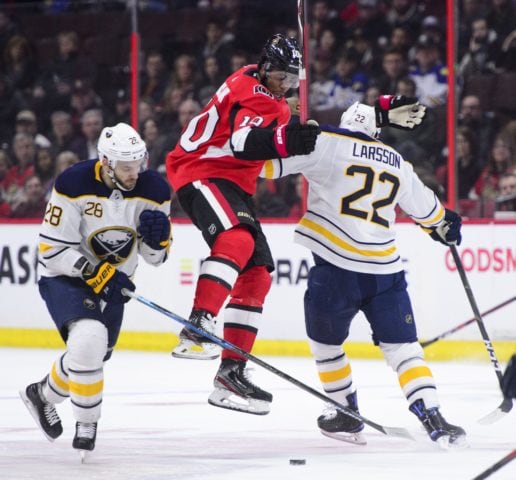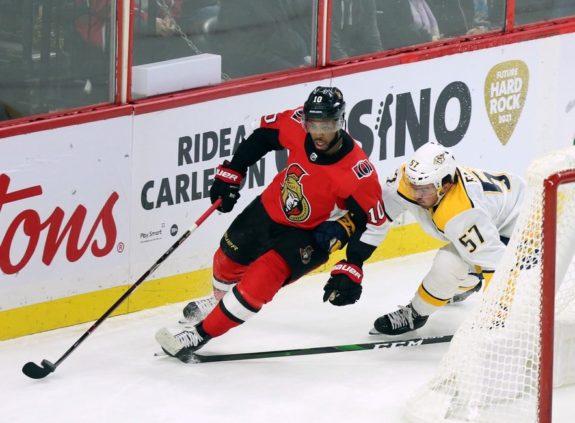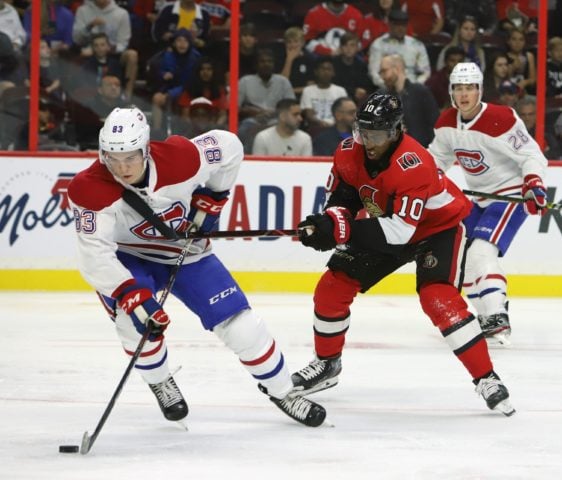Many events have transpired during the Ottawa Senators’ 2019-20 season. They have showcased that, despite the lack of pure NHL talent, the Senators do have the potential to become a team that can contend for a Stanley Cup.
One of the reasons for Senators fans to remain hopeful is the breakout season from forward Anthony Duclair. After being acquired from the Columbus Blue Jackets in the Ryan Dzingel trade last season, Duclair has been a pleasant surprise for the Senators, amassing 47 points in 70 games in Ottawa. This, of course, is amplified by an appearance at the NHL All-Star game in St. Louis, MO.

All this being said, though, this is a 24-year-old who has already surpassed his career-high in goals and is well on the way to passing his career-high in points. Something to keep in mind is that Duclair will be a restricted free agent at the end of the season – the Senators need to ask themselves, should Duclair be signed to an extension, or should the club trade him when his value is at its highest?
Is Duclair’s Play Sustainable?
Since he made his debut during the 2014-15 season, Duclair has been with five organizations. Aside from his first season with the Arizona Coyotes in 2015-16, where he was a 20-goal scorer, Duclair has struggled to find success in the NHL. His efforts were called into question while he was a Blue Jacket, coming to a head when coach John Tortorella said, “I don’t think [Duclair] knows how to play.”
Of course, the hat trick that Duclair scored against the Blue Jackets earlier this season may have changed Tortorella’s mind. The problem with Duclair is that it can’t be predicted whether his current pace is sustainable or not. Through 49 games this season, Duclair is shooting at 14.5 percent during all situations. It’s the second-highest shooting percentage of his career, and the best it’s been since his 20-goal season with the Arizona Coyotes four years ago.
Over his career, Duclair has averaged a 13.5 percent shooting percentage. When it gets interesting is when you look at his power-play numbers. Duclair is currently only shooting 12.5 percent when the Senators are on the man advantage. Granted, this is the first time since the 2015-16 season that Duclair has been getting significant power-play time. However, when you look at Duclair in this context, you realize he can improve substantially. If Duclair were to improve his power-play numbers, he could become an even more productive player.
Is Duclair a Tradable Asset?
As mentioned previously, Duclair is a restricted free agent at the end of the season. So, he will most likely be getting a substantial raise when his contract expires. It’s not a question of whether or not the Senators can afford him via the salary cap, as the Senators will have lots of space. It’s a matter of if the salary can be used elsewhere.

In comparing other players of similar ability, Duclair could demand anywhere from $3 million to $5 million per season. Are the Senators willing to pay Duclair that and bank on him being that consistent 20-goal scorer? There is always the chance that he could regress to his old self. If the Senators gamble and lose, when the time comes to spend their cap space, Duclair’s may become a problematic contract.
The upcoming trade deadline will be a seller’s market – teams will be willing to pay top dollar for the final piece that could win them a Stanley Cup. The Senators need to decide if Duclair is part of their plans for the future.
Wait and See
The Senators need to take a “wait and see” approach with Duclair. Trading him at the deadline may get the Senators a decent prospect or late first-round pick, but I believe it’s too early to make an evaluation on Duclair’s value. If he can prove to the Sens management that he can consistently be a top-six forward and show the effort a player of that caliber needs, then the Sens should sign him to an extension once the season ends.

If the Senators notice that he returns to his inconsistent ways, then Duclair’s rights can be dealt at the draft. Obviously Duclair is very talented, but he needs to continue playing with consistency. The Senators should be wary of committing to a player with a history of not being committed to the game of hockey itself.